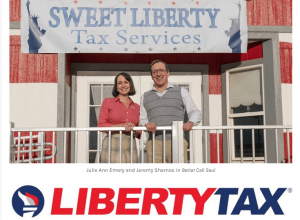AMC/Sony Pictures, the channel and studio responsible for original TV breakout smash dramas Breaking Bad and Better Call Saul, are in hot water with tax prep titan Liberty Tax Service over the content of an episode released in April of 2022 as part of Better Call Saul’s final season.
Liberty Tax Service argues that in the episode “Carrot and Stick” the bogus tax preparation service set up as a front to swindle retirees and unsophisticated yokels out of their rightful tax refunds defames and dilutes the actual company’s trademark in a way that has, is, and will continue to do harm to Liberty Tax Service’s reputation, citing “dilution, defamation, disparagement, and injurious falsehoods.”
This is an interesting case because the arguments put forth are eyebrow-raising, to say the least.
For my analysis of this case, I’m going to evaluate both sides as if I was the one presenting the arguments of each in court. I think this is going to be a lot of fun, and I hope you agree!
Let’s take a closer look at this taxing case and see what the merits are.
Liberty Tax Service’s Case
In the episode “Carrot and Stick,” a fictional (and bogus) tax prep company called Sweet Liberty Tax Services is used to defraud its honest but naïve customers. Liberty Tax Service claims that the use of the name Sweet Liberty Tax Services in the episode, along with the presence of a red, white, and blue motif and the presence of an inflatable Statue of Liberty, constitutes intentional misuse of their trademark, saying:
“Out of all the names Defendants could have used for the tax business portrayed in Episode 2, they decided not to be original at all, but instead rip off the famous Liberty Tax trademarks, which have been used for over 25 years, and mimic an actual Liberty Tax location just by adding the word ‘Sweet’ in front of Liberty Tax’s trademark.”

Liberty Tax Service asserts that their trademark includes the specific name and the use of the Statue of Liberty, as well as the colors red, blue, and gray. Interestingly, their trademark filing from 2019 when they moved from the Lady Liberty design to a tricolor torch, the color white is intended to stand in for blank space and is not considered a part of the design, as you can see in the figure below.
For comparison purposes, let’s take a look at the (fake) Sweet Liberty Tax Services branding versus the (genuine) Liberty Tax Service branding, which I found on GiantFreakingRobot.com.

The language of the precise filing would seem to work against Liberty Tax Service here when you look at the images head to head, and that’s going to be very tough to overcome. To prove that the use reflected in the show did, had, or could have resulted in “dilution, defamation, disparagement, and injurious falsehoods” leading to verifiable harm or damage to their brand and reputation, Liberty Tax Service would have to be able to conclusively demonstrate that a significant number of customers, after watching the Better Call Saul episode in question, had knowingly severed or refused to initiate existing relationships with Liberty Tax Service specifically because of an apparent and relatively modest resemblance to the imagery in the show.
This is a very narrow road to navigate with no margin for error, given the injunctive and punitive relief Liberty Tax Service is seeking from the court.
Specifically, Liberty Tax Service is requesting that AMC and its parent company, Sony Pictures, be prohibited from further releasing or displaying “Carrot and Stick,” undisclosed actual damages, and whatever punitive damages the court deems appropriate.
It’s a big ask, and it would fall on the attorney presenting the case to convince a judge and possibly a jury that Liberty Tax Service did, in fact, lose money, clientele, and/or reputation as a direct result of the episode. While it’s not impossible, it’s going to be very, very tough to manage.
AMC/Sony’s Case
Honestly, in my view, this case truly is AMC/Sony’s to lose. There is the constant specter of Liberty Tax Service needing to prove something effectively unprovable, to wit, that this one episode of an immensely popular TV show damaged their business interests and reputation so grievously that only the courts could assert a proper remedy. That’s a steep hill to climb all on its own. But let’s take a closer look.
The trademark filing for Liberty Tax Service stipulates that these words and images, in these colors, put together and rendered in this specific way, constitute the trademark under protection.
There’s nothing wrong there.
But to assert that they own the colors red and blue, or any and all rights to any usage or display of imagery involving the Statue of Liberty, is simply not true. You could trademark a specific iteration of the American flag or the Statue of Liberty or one of its component parts as part of your logo or branding, but it doesn’t follow that you then own the American flag or the Statue of Liberty by default!
The same applies to the text.
Yes, the words are all present in the same order they appear in Liberty Tax Service’s trademark, but the key distinguishing factors would seem to push that consideration out of the realm of relevance. Put simply, the typeface and element arrangement is too different and disparate to make for more than a glancing possible similarity that doesn’t hold up to close scrutiny—and would be unlikely to deceive anyone watching that the fictional fraudulent business had any semblance of legitimacy or linkage to the real, legitimate one.

Next up, the very fact that this is a clearly fictional business operated out of a trailer in the New Mexico desert, and an exceedingly tackily done-up trailer at that, is or should serve to any audience member of average sophistication that this is not a legitimate business.
Granted, many Liberty Tax Service offices have people dressed as the Statue of Liberty flipping signs and drawing attention to their offices, particularly at the peak of tax season, and the fake Sweet Liberty Tax Services has an inflatable Statue of Liberty out in front, as if it couldn’t get more overtly bizarre.
Invoking taxpayers’ inherent patriotism is hardly a new trick when it comes to convincing people they really do want to spend hours of their lives hunting up receipts and filling out seemingly endless IRS forms to make sure their accounts balance to the penny, especially when the threat of tanked credit ratings and jail time fail to garner the desired effect. However, again, just because Liberty Tax Service’s trademark incorporates those specific elements does not automatically grant them carte blanche to claim control over any and all iterations of those elements as used by anyone, anywhere, under any guise whatsoever.
Finally, there is the potential element of parody. Is it possible that someone in the writers’ room or on the set design team had a bone to pick with Liberty Tax Service and decided to air that grievance in a public “nudge-nudge-wink-wink” manner by executing the faux company’s dressing in such a cartoonishly bad fashion? Sure. But the burden of proving that this was the case would necessarily fall on Liberty Tax Service, not AMC/Sony. The unsubtle differences in the elements of the business names, the presentation, the color schemes, etc. again means any perceived similarity falls apart under closer examination. If someone pulled the same stunt in real life, using the same dressing and presentation, to claim an affiliation with Liberty Tax Service that didn’t exist, there would unquestionably be a case here. As it is, parody is an affirmative defense, especially when that parody is executed in a creative work rather than, for example, a real-world critique or review of Liberty Tax Service’s capabilities.
Taken as a whole, AMC/Sony would appear to be holding all the high cards here.
Bottom Line
So why pursue a case that appears upon initial scrutiny to have virtually no hope of succeeding in open court? To my way of thinking, there are three possible endgames. I stress again that these are only possibilities, and I am not privy to the evidence or the inner workings of the legal teams who will be trying this case. In other words, this is all pure speculation that may or may not be vindicated or nullified as and if the case proceeds.
First, Liberty Tax Service sincerely believes there is a genuine risk of trademark and brand dilution, to such a degree that proceeding in court is the only avenue available, regardless of the potential dangers involved.
In this scenario, the injunction against AMC/Sony being able to show this episode again makes sense, and the punitive damages are just icing on the cake. The actual damages incurred would be difficult or impossible to calculate, unless Liberty Tax Service intended to call every single person who didn’t use their services in 2022 versus 2021 and get them to confirm that one specific episode of one specific show soured them on Liberty Tax Service’s honesty, integrity, or professionalism.
Second, the injunction isn’t the point; the publicity is. Maybe they get a settlement or judgment in their favor, maybe not, but they’ve already gotten a wealth of free publicity at the expense of AMC/Sony, even if they end up losing the case. Cases like this tend to be memorable, and that means a good chance of winning new business for the 2023 tax season.
Third, neither the injunction nor the publicity is the point, but firing a warning shot across the bow of any competitors whom they’re trying to warn off is.
In this scenario, the point is to be able to send C&Ds to competitors and say, “Remember, we weren’t scared to sue AMC/Sony. Do you honestly think we’re afraid to drag you into open court?” In this case, again, the publicity makes sense and works in their favor by quelling any competitors who might give even the appearance of infringement by having demonstrated they’re prepared to go to the wall for their branding, even if this particular case does prove to be a dog that won’t hunt in the end.
The fear factor alone might be worth the expense.
Now, I’m not saying any of these is what will happen. I do think that elements of all of them are likely in play somewhere in Liberty Tax Service’s legal team’s strategy for pursuing this case, consciously or otherwise. But ultimately, I believe AMC/Sony has a strong enough complex of defenses against Liberty Tax Service’s assertions that they can reasonably expect to prevail if this case goes to court.
Either way, I dare say it’s going to be very taxing for everyone involved!
ABOUT JOHN RIZVI, ESQ.

John Rizvi is a Registered and Board Certified Patent Attorney, Adjunct Professor of Intellectual Property Law, best-selling author, and featured speaker on topics of interest to inventors and entrepreneurs (including TEDx).
His books include“Escaping the Gray” and “Think and Grow Rich for Inventors” and have won critical acclaim including an endorsement from Kevin Harrington, one of the original sharks on the hit TV show – Shark Tank, responsible for the successful launch of over 500 products resulting in more than $5 billion in sales worldwide. You can learn more about Professor Rizvi and his patent law practice at www.ThePatentProfessor.com
Follow John Rizvi on Social Media
YouTube: https://www.youtube.com/c/thepatentprofessor
Facebook: https://business.facebook.com/patentprofessor/
Twitter: https://twitter.com/ThePatentProf
Instagram: https://www.instagram.com/thepatentprofessor/



